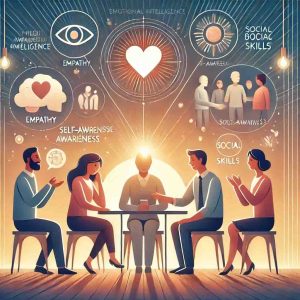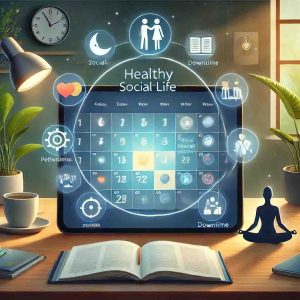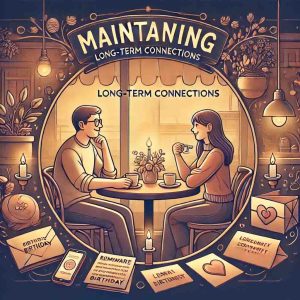The Art of Building Relationships: 7 Essential Tips
“The Art of Building Relationships”: Building a strong social network explores essential strategies for developing meaningful connections, emphasizing the importance of vulnerability, honesty, and mutual support. The article provides actionable tips on overcoming feelings of isolation and engaging more deeply with others through shared activities and open communication.“
Building meaningful relationships is not just a social nicety; it’s key to our overall well-being. Research from Harvard’s Study of Adult Development indicates that individuals with strong social networks are 50% more likely to enjoy longer, happier lives. These bonds offer more than companionship; they provide crucial emotional support, reducing stress and offering fresh perspectives during tough times.
Yet, forming such connections can be daunting, particularly in a new environment where feelings of loneliness often surface despite having acquaintances around. Overcoming fear of rejection and worries about appearing overly eager are common hurdles. But investing time in seemingly small gestures—like active listening and showing genuine interest—sets the stage for cultivating deeper relationships, which enriches both personal and professional life.
Building a Foundation: The Value of Relationships

Relationships are much more than simple interactions; they are the fabric of our emotional and psychological health. Whether it’s sharing a laugh, seeking advice, or offering support during tough times, these connections enrich our lives in countless ways. A strong social network acts as a safety net, providing us with the comfort of knowing that we are not alone. This interconnectedness contributes to our sense of belonging, which is vital for both mental and physical health. For instance, research shows that when individuals feel connected, they experience lower levels of anxiety and depression.
Emotional support plays a critical role in mitigating stress, and this support can manifest in various forms—be it a friend lending an ear or family members stepping in during challenging times. Consider that sharing your worries with someone you trust not only alleviates the burden but helps solidify those bonds through shared experiences. Herein lies the essence of nurturing relationships; it’s about exchanging vulnerabilities and offering empathy, which fosters an environment where everyone feels valued and understood.
Remember that relationships also require maintenance. Just like plants need to be watered and nourished, friendships thrive on attention and care. It’s essential to check in regularly, engage in meaningful activities together, and express gratitude toward one another. This ongoing effort not only strengthens your connections but also creates a reservoir of goodwill for times when challenges inevitably arise.
Furthermore, the long-term health benefits of these investments in relationships cannot be overstated. Individuals with robust social networks enjoy improved immune function and lower blood pressure. In fact, studies indicate that having close friends can lead to a 50% increase in survival rates compared to those who are more isolated—a compelling argument for prioritizing our social interactions.
Understanding this intrinsic value reinforces just how essential it is to cultivate these relationships actively. Recognizing the deeper elements at play will pave the way to explore how trust and effective communication serve as pivotal components in nurturing these vital connections.
Building Blocks of Connections: Trust and Communication

At the core of any meaningful relationship lies trust, acting as a sturdy foundation upon which connections are built. But even with a solid foundation, communication serves as the bridge that allows individuals to traverse the gaps that may arise in understanding one another.
When we talk about trust, it evokes the sense of reliability; it’s not just about feeling safe with someone but also knowing that they will show up and support you when needed. Trust is developed over time through shared experiences, honesty, and consistency in actions.
Meanwhile, effective communication techniques enhance this dynamic. It involves more than just exchanging words; it is the art of connecting at a deeper level.
Active listening emerges as an indispensable skill in this process. This means genuinely paying attention to what others are saying rather than merely waiting for your turn to respond. Engaging in active listening often includes non-verbal cues such as nodding or offering verbal affirmations like “I see” or “That makes sense.” These small gestures signal to the speaker that their words resonate, nurturing a safe environment where trust can flourish.
Active listening opens doors to mutual understanding, providing a space for vulnerability without fear of judgment.
The science backs this approach as studies highlight that couples who practice active listening report significantly higher levels of satisfaction in their relationships. This principle applies not only to romantic entanglements but also extends to friendships and professional partnerships. When individuals feel heard and validated, their trust in one another grows stronger.
Effective Communication Techniques
Furthermore, transparent communication fosters honesty and clarity between individuals. Being clear about thoughts and feelings minimizes misunderstandings and builds a rapport where everyone feels empowered to express their true selves.
For example, using “I” statements like “I feel” or “I think” rather than accusatory “you” statements can dramatically shift the conversation towards constructive dialogue.
Seeking feedback from others is another powerful practice in establishing trust through communication. Asking questions such as “How did you perceive our last conversation?” encourages openness while showing that you value the other person’s perspective.
By embracing active listening and transparent exchanges, you cultivate a rich social tapestry woven from threads of trust and effective communication. This approach seamlessly connects individuals and lays the groundwork for deeper bonds in the journey ahead.
Tips for Building Meaningful Friendships

Building meaningful friendships can feel daunting at times, yet it becomes easier with a focused approach on investing time and effort. It’s not just about making acquaintances; it’s about nurturing relationships that add depth and value to your life. One core principle of cultivating these connections is commitment. When you treat your relationships as a priority, they tend to gain momentum naturally.
Investing Time and Effort
To begin with, establish a routine of regular check-ins with your friends. This doesn’t have to be elaborate; a simple text message or brief phone call asking, “How have you been?” can work wonders in keeping the relationship vibrant. Consistency plays a significant role here; relationships thrive when both parties recognize their importance.
Building connections isn’t about grand gestures, but rather consistency in small acts.
Next, consider the power of shared activities. Engaging in activities you both enjoy deepens your connection by creating shared memories. Whether it’s hiking, cooking together, or having a movie marathon, these experiences foster intimacy and understanding between friends. When you participate in something fun together, laughter flows naturally, and conversations become more profound without you even realizing it.
Transitioning from casual interactions to deeper conversations often results from doing things you both love.
Another critical aspect is the value of openness in communication. Being candid about your feelings makes it easier for your friends to do the same. Emotional vulnerability can initially feel intimidating, but expressing authentic emotions helps create a sense of closeness that builds trust over time. Sharing personal stories or discussing challenges fosters genuine connections that go beyond surface-level small talk.
Each of these tips forms part of a larger tapestry of friendship-building practices rooted in mutual respect and understanding. By treating friendships with intention and care, you enhance your social life while positively contributing to those around you.
As we explore further, let’s turn our attention to strategies designed specifically for meeting new people and expanding connections beyond current circles.
Expanding Your Social Network: Meeting New People

The world is full of opportunities waiting to be seized, yet many of us hesitate when it comes to reaching out and connecting with others. Taking that first step can feel daunting, but it’s fundamentally a crucial part of forging meaningful relationships. One effective way to meet new people is through volunteering for community projects. By engaging in these initiatives, you not only contribute to a cause but also find yourself surrounded by like-minded individuals who share similar values, creating instant connections based on common interests.
Other methods include:
-
Attending local events: Things like fairs, concerts, or lectures can provide rich contexts for meeting diverse groups. You never know how the next conversation might lead to a rewarding relationship.
-
Joining clubs: These can span from book clubs to fitness classes. Participating in something you love will naturally connect you with individuals who share your passions.
-
Utilizing online platforms: Websites like Meetup facilitate not just the discovery of locals with shared interests but also encourage participation in unique social activities.
Each method opens doors, creating pathways to genuine interactions that matter.
Reflecting on my own journey, I recall the time I enrolled in a local cooking class. Initially, apprehension filled my mind—stepping into a room full of strangers felt intimidating. However, as the sessions unfolded, we shared laughter over culinary mishaps and discovered tastes together. By the end, I had formed friendships with five people who not only shared my love for cooking but also sparked delightful conversations about life itself. Connecting over something so simple allowed me to break awkward barriers without even noticing.
And let’s be honest—cooking disasters are excellent icebreakers!
Expanding your social network isn’t merely an exercise in meeting new faces; it redefines your life’s tapestry, enriching it with various threads woven together through interactions and experiences. Embrace these opportunities; they’re more than just chances to meet people—they’re gateways to forming lasting memories and relationships that can positively impact your life.
It’s through these connections that we build a better understanding of ourselves and others, paving the way for deeper insights in our interactions moving forward.
Emotional Intelligence in Social Interactions

Emotional Intelligence (EI) is not just a concept confined to psychology; it’s a vital skill that influences how we connect with others. Understanding and managing your emotions, as well as those of others, is essential for building strong social networks.
For instance, when you step into a room full of strangers, your ability to read the collective mood can determine how well you connect with individuals. This sensitivity goes beyond mere observation; it means being tuned into non-verbal cues like body language and facial expressions, which often convey more than words ever could.
Core Components of EI
At the heart of EI are its core components: self-awareness, self-regulation, motivation, empathy, and social skills. Each of these elements intertwines beautifully to create a framework for effective interaction.
Self-awareness is all about recognizing your own emotional tendencies; understanding why you feel a certain way allows you to respond rather than react impulsively. Self-regulation follows, providing you the control needed to manage those emotions, especially in challenging situations—a skill that can prevent conflicts from escalating.
Motivation drives you not just to achieve personal goals but also to foster meaningful connections with others.
Empathy allows you to step into someone else’s shoes, giving you insights into their emotional landscapes. When you’re genuinely able to feel what they feel, communication becomes easier, and trust quickly builds. Finally, strong social skills enable you to navigate conversations effectively and nurture relationships over time.
Research consistently supports the significance of these components. Findings published in the Journal of Applied Psychology reveal that individuals who exhibit high levels of emotional intelligence tend to not only perform better professionally but also cultivate more profound personal relationships. As such, enhancing your EI serves both personal fulfillment and professional success.
However, while understanding these components is an early step, developing them requires practice and commitment in real-life scenarios. Exploring deeper methods for fostering interpersonal connections can amplify emotional resilience and boost overall relationship quality.
Cultivating Empathy and Understanding
Empathy is indeed a powerful tool, allowing us to not only feel what another person feels but also to forge stronger bonds by understanding their perspective. By practicing empathy, we open the door to more meaningful conversations and interactions.
For instance, imagine when a friend shares their experience of loss; instead of immediately jumping in to offer solutions or simply offering your condolences, allow yourself to truly listen. This involves recognizing the emotions at play and validating their feelings. Such an approach can make them feel heard, appreciated, and less isolated in their pain.
As you engage with others, hone your active listening skills. Instead of formulating your response while they are still talking, try to absorb what they are saying without interruption. Use follow-up questions that dig deeper into their feelings—questions like, “What was the hardest part for you?” can encourage a richer dialogue and show that you genuinely care. It’s crucial to remember that understanding someone’s viewpoint means often stepping away from your own biases or preconceived notions.
In addition to listening, it’s beneficial to regularly reflect on your responses and actions. Ask yourself how your replies may come across to others, and be mindful of language that could either uplift or diminish another person’s feelings. A little mindfulness regarding your words can create an environment where vulnerability thrives.
Moreover, empathy is a practice that compounds over time. The more frequently you seek to understand others’ experiences, the better equipped you become at connecting with them on deeper levels. Consider moments when you empathized with someone who appeared troubled; this act not only strengthens your relationship with them but also encourages a reciprocal act of vulnerability in return.
As you embark on this journey of enhancing your empathetic abilities, know that it’s important to be patient with yourself as well as others. Everyone is navigating their battles in different ways. When you extend understanding even during difficult times, you are laying the groundwork for resilient relationships that can weather any storm together.
Cultivating empathy enriches our interactions and relationships significantly, and this exploration naturally leads us to consider practical methods for maintaining these essential connections in our lives.
Strategies for a Healthy Social Life

One of the most impactful ways to create and maintain a healthy social life is by planning ahead. In our increasingly busy lives, using technology like calendar apps can simplify this process tremendously. By scheduling social activities in advance, you not only carve out time for friends and family but also lay the groundwork for personal downtime.
It’s easy to get lost in a whirlpool of commitments, so incorporating alone time into your planning becomes just as crucial.
This blend of social engagements with personal time will help stave off feelings of burnout that can arise from an over-packed schedule. It’s vital to recognize when you’re nearing your limits; socializing should uplift you, not drain you. Imagine investing in friendships while still guarding your mental space—it’s a delicate balancing act worth mastering.
Regularly reviewing your social calendar can ensure that it aligns with your personal goals and emotional well-being. There’s power in reflection; it allows you to examine what activities energize you or leave you feeling depleted.
As you assess your commitments, ask yourself whether certain engagements contribute positively to your life or if they simply fill up empty slots in your calendar.
With a clear understanding of your calendar and how it reflects your priorities, nurturing those scheduled interactions will lead you towards stronger connections and deeper relationships. It’s essential to explore how these relationships can evolve over time.
Maintaining Long-term Connections

Long-lasting friendships are not just born; they are cultivated through intention and care. Consistent communication plays a vital role in this nurturing process. This doesn’t mean inundating your friends with messages every day, but rather making it a priority to reach out regularly.
Whether it’s a quick text asking how they are or a casual phone call to catch up, these small gestures help keep the connection alive. A simple “thinking of you” message can mean a lot, even in today’s fast-paced world where it’s easy to forget the value of personal touch.
Consistent Communication
The consistency of your outreach matters significantly. Aim for at least a few touches each month, even if they’re brief. Try to set reminders in your calendar to ensure those moments don’t slip by. It’s about quality over quantity. When friends know that you genuinely care and that you’re invested in their lives, it fosters a deeper relationship that can withstand distance and time.
Remember, no gesture is too small. Even sending a quick meme or sharing an article relevant to your friend’s interests can rekindle the warmth of your friendship.
Mutual Support
Another cornerstone of maintaining long-term connections is mutual support. Friendships thrive on the give-and-take principle; celebrating each other’s successes and offering support during tough times is what truly binds individuals together.
It doesn’t have to be grand; it can be as simple as celebrating birthdays or significant milestones with a heartfelt note or just being there when they need someone to listen.
One small yet impactful gesture might be sending a birthday card or remembering anniversaries—these actions communicate that you care and appreciate them in your life. Plus, sharing joys like promotions or accomplishments encourages a sense of community and belonging within your friendship circle.
These practices ensure that your friendships age like fine wine, becoming richer and more satisfying over time. They enhance not only the quality of friendships but also provide invaluable emotional support as life’s challenges arise.
In nurturing our relationships through consistent outreach and mutual support, we create a robust social network that enhances our well-being and enriches our lives. Building these connections takes effort, but the rewards are immense and deeply fulfilling.
Conclusion: The Journey of Connection
Building and maintaining relationships is an ongoing journey that requires dedication, emotional intelligence, and genuine care for others. As we’ve explored throughout this article, the rewards of investing in your social network extend far beyond simple companionship – they touch every aspect of your life, from your mental and physical health to your personal growth and resilience.
Remember that creating meaningful connections isn’t about accumulating a large number of acquaintances, but rather about nurturing quality relationships built on trust, understanding, and mutual support. Each relationship is unique, with its own rhythm and depth, and deserves attention tailored to its specific nature. Whether it’s a decades-long friendship or a budding connection, the principles of active listening, empathy, and consistent communication remain crucial.
As you move forward in your relationship-building journey, be patient with yourself and others. Some connections will develop naturally and quickly, while others may take time to deepen. What matters most is staying authentic, showing up consistently for those you care about, and remaining open to new connections while nurturing existing ones.
In today’s increasingly digital world, it’s worth remembering that genuine human connections are more valuable than ever. They provide the emotional sustenance we need to thrive, the support system to help us through challenges, and the shared joy that makes life’s celebrations more meaningful. By implementing the strategies and insights shared in this article, you’re not just building a social network – you’re creating a tapestry of relationships that will enrich your life for years to come.
The effort you invest in building and maintaining these connections will return to you many times over, creating a legacy of meaningful relationships that contribute to both your happiness and that of those around you. After all, at the end of the day, it’s not the number of connections we make that matters most, but the depth and quality of the relationships we nurture along the way.
If you’re interested in one of the other 4 aspects of Holistic Health that will revolutionize your life, check out the 5 Aspects of Holistic Health for Beginners: 2025 Complete Guide







